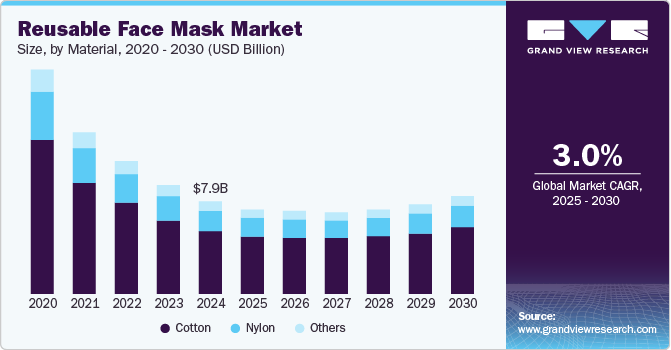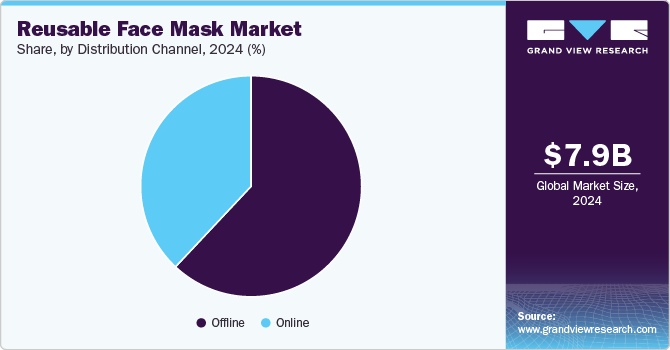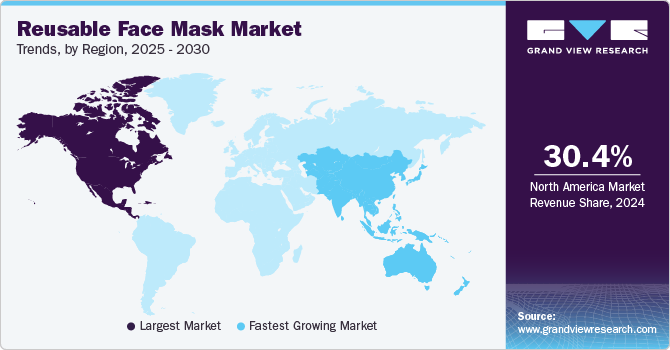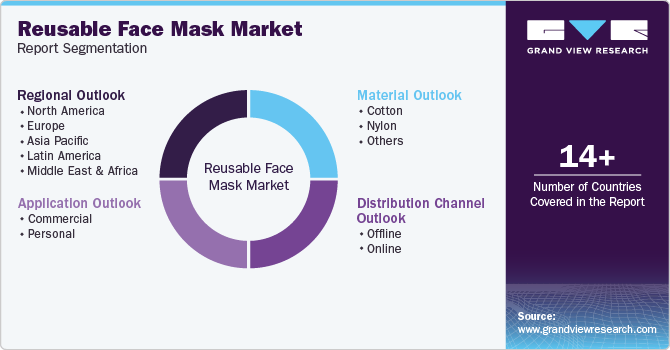- Home
- »
- Beauty & Personal Care
- »
-
Reusable Face Mask Market Size, Industry Report, 2030GVR Report cover
![Reusable Face Mask Market Size, Share & Trends Report]()
Reusable Face Mask Market (2025 - 2030) Size, Share & Trends Analysis Report By Material (Cotton, Nylon), By Application (Commercial, Personal), By Distribution Channel (Online, Offline), By Region (North America, Europe, APAC, LATAM), And Segment Forecasts
- Report ID: GVR-4-68039-212-8
- Number of Report Pages: 80
- Format: PDF
- Historical Range: 2018 - 2023
- Forecast Period: 2025 - 2030
- Industry: Consumer Goods
- Report Summary
- Table of Contents
- Segmentation
- Methodology
- Download FREE Sample
-
Download Sample Report
Reusable Face Mask Market Size & Trends
The global reusable face mask market size was estimated at USD 7.95 billion in 2024 and is expected to grow at a CAGR of 3.0% from 2025 to 2030. Rising adoption of face masks as a precautionary measure to protect oneself from various diseases, including anthrax, influenza, avian bird flu, swine flu, Ebola, and the recent coronavirus, has fueled consumer demand for reusable face masks. There has been growing awareness among people that masks are an effective way of controlling the spread of the virus from an infected person as well as the environment, which has been an immediate factor to spur the product demand.

The COVID-19 pandemic, prompting around 50 countries to declare a national emergency, significantly increased the global demand for reusable face masks. This surge in demand led established companies and new entrants from various industries to explore the reusable face mask industry. In addition, factors such as increased air pollution, industrial emissions, vehicle emissions, urban smog, and household and farming chemicals have led to a rise in airborne diseases, such as asthma, COPD, and various respiratory and cardiovascular infections. According to the State of Global Air 2024 report, air pollution continued to be a major cause of death in 2021, contributing to 8.1 million deaths and millions of years of healthy life lost globally. These factors significantly contribute to the demand for face masks.
In 2024, air pollution in Delhi and the National Capital Region (NCR) reached alarming levels, leading to a significant surge in the sales of face masks, according to local traders. Delhi's air quality dropped to the 'severe plus' category, with the Air Quality Index (AQI) reaching a record 484, the highest on record, according to the Central Pollution Control Board (CPCB). Furthermore, the rise in entrants, local manufacturers, and startups in the reusable face mask market has spurred innovation in sustainability. Reusable face masks protect from air pollution and reduce single-use plastic waste and pollution, as they can be washed and reused.
Material Insights
The cotton reusable face mask segment dominated the industry and accounted for the largest revenue share of 68.7% in 2024. In June 2020, the Centers for Disease Control and Prevention (CDC) recommended that people wear a cloth face mask to avoid transmission of the virus in public places. Many companies produce reusable cloth face masks with two tightly woven cotton fabric layers. These masks help reduce the transmission of infection while maintaining breathability. In 2020, Hanes introduced the 3-ply all-cotton reusable face masks in 5-count and 10-count packs, available at various retailers. In addition, California Textile Group, a wholesale textile group, announced the expansion of its product line to include cotton face masks, which have antimicrobial properties and can be customized as per consumer demand.
The nylon reusable face mask market is expected to grow at the fastest CAGR of 3.5% over the forecast period. Prospective manufacturers focus on material innovations to secure a foothold in the market for the long run. Nylon layering provides additional protection to the mask from air pollutants, such as PM 2.5. Though the scope to achieve product differentiation is limited, prospective market players focus on delivering more patterns and fabrics in reusable face masks to target a broader range of consumers worldwide. For instance, 3M Company added a nylon stocking layer to their face mask offering, and results showed that this blocked 75% of air particles.
Application Insights
The personal reusable face mask segment led the industry with the largest revenue share in 2024. Reusable masks are washable, customizable, and durable compared to disposable or surgical masks. Moreover, they are available in various designs and fabrics. Major companies collaborate with multiple sectors to increase their demand. For instance, in December 2024, Jockey supplied protective masks to the Delhi Traffic Police in response to rising air pollution. The gesture was appreciated as a contribution to the safety of personnel working in harsh conditions.
The commercial reusable face mask market is estimated to grow at the fastest CAGR over the forecast period. Various industries, such as healthcare, pharmaceutical, hospitality, and food processing, require masks that fulfill specific demands. Face masks are mandatory in some industries to protect workers against infections. The manufacturing sector enforces strict government controls on workers in workplaces, factories, and construction areas. Healthcare workers face a high risk of exposure to infectious viral diseases. They use various protective masks to mitigate this risk, including filtering face-piece respirators (FFP3).
Distribution Channel Insights
The offline channel led the reusable face mask market with the largest revenue share in 2024. Most brick-and-mortar stores focus on offering detailed descriptions of products and allowing customers to choose from numerous brands before making a purchase. Increased availability of variants due to increased demand and physical verification of the mask are among the key factors driving sales through this segment. An increasing number of manufacturers have been offering reusable masks in different designs and themes to attract customers from all walks of life.

The online distribution channel segment is estimated to grow at the fastest CAGR over the forecast period. Rising internet penetration across the globe and targeted marketing by companies through social media platforms to reach all customer touchpoints are likely to fuel the growth of this segment. With the growing popularity of quick online deliveries and the inclusion of reusable face masks in the product lines of various brands, the demand for online purchases is expected to rise significantly. For instance, Myntra offers a range of reusable masks, such as the Puma face masks in a pack of 2 and reusable face masks by Flying Berry, at different price points.
Regional Insights
The North American reusable face mask market dominated the global market with the largest revenue share of 30.4% in 2024. According to Health Canada, air pollution in Canada in 2018 was linked to 17,400 premature deaths, 3.6 million asthma symptom days, and 39 million acute respiratory symptom days. These figures highlight the significant impact of air pollution on public health and its strain on the healthcare system. Furthermore, prolonged exposure to polluted air can lead to chronic obstructive pulmonary disease (COPD), heart disease, and lung cancer. In 2024, 32,100 Canadians are estimated to be diagnosed with lung and bronchus cancer, accounting for 13% of all new cancer cases, according to the Canadian Cancer Society.

U.S. Reusable Face Mask Market Trends
The U.S. led the North American reusable face mask market with the largest revenue share in 2024. Air pollution in the U.S. significantly impacts public health, damaging the lungs and increasing the risk of respiratory and heart diseases. Each year, 26.8 million Americans, including 4.5 million children, suffer from asthma, and the strain on healthcare systems has been immense. In 2022, heart disease claimed the lives of 702,880 people in the U.S. Preventive measures such as using face masks are crucial to mitigate these effects. The LA wildfires caused significant damage and released harmful pollutants. In addition, reusable face masks promote sustainability by reducing waste, making them an effective and eco-friendly solution to air pollution.
Europe Reusable Face Mask Market Trends
The Europe reusable face mask industry held a substantial market share in the global market in 2024. The UK National Healthcare Service witnessed a 70-fold increase in the use of medical masks and respirators, rising from 20 million units in 2019 to 1.4 billion in 2020. This surge led to significant waste and environmental concerns, including increased littering. The demand for masks also outpaced supply, prompting the Government of the UK to recommend reusable cloth masks for the public to preserve certified masks for healthcare workers.
In addition, a survey done in 2021 revealed that 66.2% of UK healthcare workers supported reusable masks for their environmental benefits. The National Healthcare System in the UK aims to become carbon-neutral by 2040, reducing clinical waste. These factors have increased the demand for the reusable face mask market.
Asia Pacific Reusable Face Mask Market Trends
The Asia Pacific reusable face mask market is expected to grow at the fastest CAGR of 2.8% over the forecast period. In South Korea, wearing masks is a sign of thoughtfulness and modesty. In addition, K-pop stars have made trendy masks a popular fashion accessory among young people in many Asian countries. The Seoul Metropolitan Government's "Zero Waste Seoul" campaign, launched in 2018, aims to cut single-use products and reduce waste drastically. Major manufacturers are adopting various regional market strategies, including expanding distribution channels to widen their customer base.
The China reusable face mask market dominated the Asia Pacific market with the largest revenue share in 2024. A survey conducted in March 2023 revealed that 69% of Chinese people still wore masks, with over 93% using disposable ones and more than 70% using multiple masks daily. This led to the consumption of at least 20.3 billion disposable masks in March 2023 and an estimated 238.5 billion for the entire year. This contributed to 1.4 billion disposable masks, or 350 tons of plastic waste, being casually released into the environment. This survey drove the need for stricter guidelines and support for reusable, non-toxic mask innovations.
Furthermore, according to the WHO, air pollution contributes to approximately 2 million deaths annually in China. In 2022, China recorded an estimated 4,824,700 new cancer cases and 2,574,200 cancer-related deaths, making cancer the most prevalent disease in the country.
Key Reusable Face Mask Company Insights
Some of the key players in the reusable face mask industry include Respro, Moldex-Metric, Ohlone Press LLC (Vogmask), and KCWW. The companies stay competitive by focusing on innovation, sustainability, and quality. They invest in advanced filtration technologies, eco-friendly materials, and comfortable designs. They also expand through global distribution channels, collaborate with health organizations, and respond to growing environmental concerns, ensuring they meet the demands of consumers and regulatory standards worldwide.
-
Respro is a manufacturing company that offers high-performance air filtration products. It designs and produces advanced respiratory protection solutions, including face masks, filters, and accessories, to safeguard users from air pollution, allergens, and airborne contaminants. Respro's products are popular among cyclists, outdoor enthusiasts, and industrial workers.
-
Moldex-Metric is a manufacturer of innovative hearing and respiratory protection products. It is known for its earplugs, earmuffs, and respirators. Moldex-Metric serves various industries, including construction, manufacturing, and healthcare. The company focuses on delivering comfort, performance, and safety to protect workers from hazardous noise and airborne particles.
Key Reusable Face Mask Companies:
The following are the leading companies in the reusable face mask market. These companies collectively hold the largest market share and dictate industry trends.
- Respro
- Moldex-Metric
- Ohlone Press LLC (Vogmask)
- KCWW
- Cambridge Mask Co
- Totobobo
- ARAX Co., LTD.
- Aetheris Technology (Shanghai) Co., Ltd
- Debrief Me
- idMASK
Recent Developments
-
In April 2024, Natural Living, a trusted provider of health and wellness products for over 20 years, began stocking Cambridge Masks, known for their advanced military-grade filtration technology. These reusable, washable masks effectively filter particles as small as 0.3 microns, offering superior protection against pollutants, allergens, and viruses.
Reusable Face Mask Market Report Scope
Report Attribute
Details
Market size value in 2025
USD 7.33 billion
Revenue forecast in 2030
USD 8.51 billion
Growth rate
CAGR of 3.0% from 2025 to 2030
Base year for estimation
2024
Historical data
2018 - 2023
Forecast period
2025 - 2030
Quantitative units
Revenue in USD million/billion, and CAGR from 2025 to 2030
Report coverage
Revenue forecast, company ranking, competitive landscape, growth factors, and trends
Segments covered
Material, application, distribution channel, region
Regional scope
North America, Europe, Asia Pacific, Latin America, MEA
Country scope
U.S.; Canada; Mexico; Germany; France; UK; Italy; Spain; China; India; Japan; Australia & New Zealand; South Korea; Brazil; South Africa
Key companies profiled
Respro; Moldex-Metric; Ohlone Press LLC (Vogmask); KCWW; Cambridge Mask Co; Totobobo; ARAX Co .,LTD.; Aetheris Technology (Shanghai) Co., Ltd; Debrief Me; idMASK.
Customization scope
Free report customization (equivalent up to 8 analysts working days) with purchase. Addition or alteration to country, regional & segment scope.
Pricing and purchase options
Avail customized purchase options to meet your exact research needs. Explore purchase options
Global Reusable Face Mask Market Report Segmentation
This report forecasts revenue growth at global, regional, and country levels and provides an analysis of the latest industry trends in each of the sub-segments from 2018 to 2030. For this study, Grand View Research has segmented the global reusable face mask market report based on material, application, distribution channel, and region:

-
Material Outlook (Revenue, USD Million, 2018 - 2030)
-
Cotton
-
Nylon
-
Others
-
-
Application Outlook (Revenue, USD Million, 2018 - 2030)
-
Commercial
-
Personal
-
-
Distribution Channel Outlook (Revenue, USD Million, 2018 - 2030)
-
Online
-
Offline
-
-
Regional Outlook (Revenue, USD Million, 2018 - 2030)
-
North America
-
U.S.
-
Canada
-
Mexico
-
-
Europe
-
Germany
-
France
-
U.K.
-
Italy
-
Spain
-
-
Asia Pacific
-
China
-
India
-
Japan
-
Australia & New Zealand
-
South Korea
-
-
Latin America
-
Brazil
-
-
Middle East and Africa (MEA)
-
South Africa
-
-
Frequently Asked Questions About This Report
b. The global reusable face mask market size was estimated at USD 7.95 billion in 2024.
b. The global reusable face mask market is expected to expand at a compound annual growth rate (CAGR) of 3.0% from 2025 to 2030.
b. The cotton reusable face mask segment dominated the industry and accounted for the largest revenue share of 68.7% in 2024. In June 2020, the Centers for Disease Control and Prevention (CDC) recommended that people wear a cloth face mask to avoid transmission of the virus in public places. Many companies produce reusable cloth face masks with two tightly woven cotton fabric layers. These masks help reduce the transmission of infection while maintaining breathability. In 2020, Hanes introduced the 3-ply all-cotton reusable face masks in 5-count and 10-count packs, available at various retailers. In addition, California Textile Group, a wholesale textile group, announced the expansion of its product line to include cotton face masks, which have antimicrobial properties and can be customized as per consumer demand.
b. Some of the key players in the global reusable face mask market include Respro; Moldex-Metric; Ohlone Press LLC (Vogmask); KCWW; Cambridge Mask Co; Totobobo; ARAX Co .,LTD.; Aetheris Technology (Shanghai) Co., Ltd; Debrief Me; idMASK.
b. Rising adoption of face masks as a precautionary measure to protect oneself from various diseases, including anthrax, influenza, avian bird flu, swine flu, Ebola, and the recent coronavirus, has fueled consumer demand for reusable face masks. There has been growing awareness among people that masks are an effective way of controlling the spread of the virus from an infected person as well as the environment, which has been an immediate factor to spur the product demand.
Share this report with your colleague or friend.
Need a Tailored Report?
Customize this report to your needs — add regions, segments, or data points, with 20% free customization.

ISO 9001:2015 & 27001:2022 Certified
We are GDPR and CCPA compliant! Your transaction & personal information is safe and secure. For more details, please read our privacy policy.
Trusted market insights - try a free sample
See how our reports are structured and why industry leaders rely on Grand View Research. Get a free sample or ask us to tailor this report to your needs.










